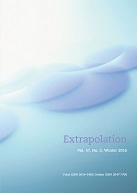
EXTRAPOLATION
Scope & Guideline
Pioneering Innovative Scholarship in Cultural Studies
Introduction
Aims and Scopes
- Speculative Fiction Analysis:
The journal focuses on critical analysis and interpretation of speculative fiction across various media, including literature, film, and television. It encourages investigations into narrative structures, themes, and the socio-political implications of speculative narratives. - Interdisciplinary Approaches:
'EXTRAPOLATION' promotes an interdisciplinary approach, integrating perspectives from literary studies, cultural studies, philosophy, sociology, and environmental studies. This breadth allows for a rich examination of how speculative fiction reflects and critiques contemporary issues. - Cultural and Historical Contextualization:
The journal emphasizes the importance of situating speculative works within their cultural and historical contexts, exploring how they engage with issues such as identity, technology, and the environment, thereby contributing to a deeper understanding of their relevance. - Emerging Voices and Diverse Perspectives:
A commitment to highlighting emerging voices and diverse perspectives is central to the journal's mission. It seeks to amplify underrepresented narratives within speculative fiction, particularly those related to race, gender, and ecological concerns. - Critical Engagement with Genre:
'EXTRAPOLATION' critiques and redefines genre boundaries within speculative fiction, encouraging authors to challenge traditional categorizations and explore hybrid forms that reflect contemporary narratives.
Trending and Emerging
- Posthumanism and Transhumanism:
Recent publications have increasingly explored themes related to posthumanism and transhumanism, reflecting a growing interest in the implications of technology on identity, agency, and the human condition. This trend is particularly relevant in discussions surrounding artificial intelligence and biotechnology. - Environmental and Ecofeminist Discourse:
There is a notable rise in articles that engage with environmental themes and ecofeminist discourse, highlighting the intersection of ecology, gender, and speculative fiction. This trend aligns with global concerns over climate change and the search for sustainable futures. - Decolonial and Indigenous Narratives:
Emerging themes include the exploration of decolonial and Indigenous narratives within speculative fiction. These works challenge colonial histories and offer alternative perspectives on identity, culture, and belonging, enriching the discourse within the genre. - Intersectionality in Speculative Fiction:
The journal has seen an increase in analyses that emphasize intersectionality, examining how multiple identities interact within speculative narratives. This trend indicates a growing recognition of the complexity of identity and the importance of diverse voices in speculative literature. - Futurist Perspectives and Utopian Visions:
A trend towards futurist perspectives and utopian visions is emerging, with authors exploring hopeful and imaginative scenarios that challenge dystopian narratives. This focus on envisioning positive futures reflects a cultural shift towards optimism and innovation in response to contemporary challenges.
Declining or Waning
- Traditional Science Fiction Tropes:
There appears to be a decreasing focus on traditional science fiction tropes, such as hard science fiction and space exploration narratives. As the genre evolves, there is a shift toward more nuanced and socially aware storytelling that prioritizes character development and cultural critique over mere technological speculation. - Binary Gender Narratives:
The journal has seen a decline in articles that focus on binary gender narratives in speculative fiction. This shift suggests a growing awareness and critique of gender essentialism, aligning with broader societal movements toward inclusivity and diverse representations. - Eurocentric Perspectives:
There is a noticeable reduction in works that center exclusively on Eurocentric perspectives within speculative fiction. This decline reflects an increasing recognition of the importance of global and multicultural narratives that challenge traditional literary canons. - Apocalyptic and Dystopian Themes:
While still prevalent, there is a slight decline in the emphasis on apocalyptic and dystopian themes in favor of more optimistic and utopian visions within speculative narratives. This trend indicates a shift towards exploring solutions and hopeful futures rather than solely focusing on catastrophe. - Standalone Works:
The journal is moving away from analyses of standalone works in favor of discussions surrounding series and interconnected narratives. This trend suggests a growing interest in exploring how narratives develop over time and their impact on cultural dialogues.
Similar Journals

TEXT & KRITIK
Unveiling critical frameworks for contemporary analysis.TEXT & KRITIK, an esteemed academic journal published by EDITION TEXT KRITIK GMBH in Germany, serves as a critical platform for advancing scholarship in the fields of literature and literary theory. With an ISSN of 0040-5329, this publication aims to foster rigorous discourse and stimulate intellectual inquiry from 2009 to 2023, reflecting the evolving landscape of literary studies. Although categorized in the fourth quartile (Q4) in the 2023 measure of literature and literary theory, TEXT & KRITIK consistently engages with a diverse array of literary perspectives and methodologies, addressing both historical texts and contemporary literature. Researchers, professionals, and students alike are encouraged to explore this resource to deepen their understanding of critical texts and theoretical frameworks. While it does not currently operate on an open access model, its curated content remains a vital resource for anyone dedicated to exploring the nuances of literary analysis and criticism.

Current Writing-Text and Reception in Southern Africa
Unveiling Diverse Narratives in Southern African LiteratureCurrent Writing-Text and Reception in Southern Africa is a premier journal published by Routledge Journals, Taylor & Francis Ltd., specializing in the vibrant field of Literature and Literary Theory. With ISSN 1013-929X and E-ISSN 2159-9130, this journal has been a pivotal platform for scholarly discourse since its inception in 1989, continuing through to 2024. Located in the United Kingdom, it emphasizes the uniquely diverse literary landscape of Southern Africa, making it an essential resource for researchers, professionals, and students who engage with the rich cultural narratives of the region. Ranking in the Q3 category for Literature and Literary Theory, it holds a commendable position in the Scopus ranks, situated at #424/1106 with a 61st percentile, highlighting its influence and relevance in academic discussions. Though not open access, this journal serves as a vital conduit for innovative research, critical analysis, and theoretical exploration, underpinning the significance of text and reception in contemporary literary studies.
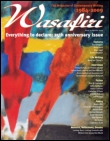
Wasafiri
Navigating the rich tapestry of cultural narratives.Wasafiri, published by Routledge Journals, Taylor & Francis Ltd, stands as a pivotal platform in the fields of Cultural Studies and Literature and Literary Theory. With a proud publication history extending from 1984 to 2024, this esteemed journal delivers critical insights and cutting-edge research that explore the intersections of culture, literature, and global discourse. Renowned for its academic rigor, Wasafiri holds a Q3 ranking in both its categories as of 2023, showcasing its solid contributions to the scholarly community, reflected in its respectable Scopus rankings—evidencing its relevance and authority, particularly in the literature field. While available through subscription, the journal emphasizes the dissemination of diverse voices and innovative scholarship, appealing to researchers, professionals, and students eager to deepen their understanding of contemporary cultural narratives. Positioned in the United Kingdom, Wasafiri continues to foster vibrant dialogues that challenge conventional paradigms, making it an invaluable resource for anyone engaged in the humanities.
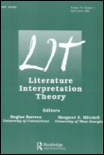
LIT-Literature Interpretation Theory
Advancing Critical Thought in Literature.LIT-Literature Interpretation Theory is a premier academic journal that delves into the intricate relationships between literature and various interpretative theories, published by Routledge Journals, Taylor & Francis Ltd. With an ISSN of 1043-6928 and E-ISSN 1545-5866, this journal has established a notable reputation within the field, evidenced by its ranking in the 71st percentile among peers, and its placement in Q3 of the Literature and Literary Theory category for 2023. Since its inception in 1989 and continuing through 2024, LIT has aimed to provide a platform for the examination of literary texts through diverse theoretical lenses, catering not only to scholars and researchers but also to students and practitioners interested in literary discourse. Although it does not offer open access, the journal continues to be a vital resource for those seeking to enhance their understanding of literary theory within the arts and humanities. With robust insights and critical analyses, LIT contributes significantly to ongoing conversations in literature and promotes innovative interpretations that challenge conventional perspectives.
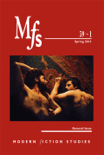
MFS-Modern Fiction Studies
Illuminating the Future of Fiction StudiesMFS-Modern Fiction Studies is a premier journal in the field of literature and literary theory, published by Johns Hopkins University Press. With an impressive impact factor and a 2023 classification in Q1, this journal stands out as a vital resource for scholars, researchers, and practitioners interested in contemporary fiction analysis and criticism. The journal aims to foster innovative scholarship, enhance discussions around literary trends, and explore the intricacies of modern narrative forms. Notably, it ranks #119 among 1,106 in the Scopus Arts and Humanities category, placing it within the top 89th percentile. Published four times a year, MFS is committed to making significant contributions to the understanding of modern fiction, making it a must-read for anyone vested in the evolution of literature. Access options are available through institutional subscriptions, ensuring that readers can engage with cutting-edge research and discourse in the literary community.
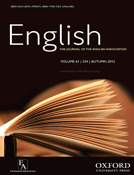
ENGLISH
Fostering a Community of Literary ScholarsENGLISH, published by Oxford University Press, is a distinguished journal in the field of Literature and Literary Theory, holding a solid place in the academic community with its Q3 ranking in the 2023 Category Quartiles. With the ISSN 0013-8215 and E-ISSN 1756-1124, this journal has been an essential platform for scholarly discourse from 2003 to 2023. It caters to a diverse audience, including researchers, academics, and students, by providing insightful articles that delve into various dimensions of English literature. While it is not an open access journal, it continues to be recognized for its valuable contributions, as reflected in its Scopus ranking of #297 out of 1106 in the Arts and Humanities, situating it in the 73rd percentile. The journal's commitment to enhancing the study of literature makes it an invaluable resource for those seeking to expand their understanding of literary theory and practice.
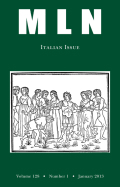
MLN
Fostering Innovative Research in Linguistics and LiteratureMLN, published by Johns Hopkins University Press, is a leading academic journal that spans the fields of Linguistics, Literature, and Literary Theory. Serving as a crucial platform for scholarly discourse, MLN has established itself with a substantial impact factor and a dedicated readership, particularly recognized in its category quartiles—ranking Q3 in Linguistics and Language, and Q2 in Literature and Literary Theory as of 2023. The journal provides a vital venue for innovative research and discussions that push the boundaries of language studies and literary analysis, fostering an engaged community among researchers, students, and professionals. Although not open access, MLN maintains its commitment to academic rigor and accessibility in the United States from its base in Baltimore, Maryland, offering valuable insights and significant contributions from converged years spanning 2002 to 2024. With a competitive standing in Scopus rankings, it continues to be an essential resource for those looking to deepen their understanding of the dynamic intersections between language and literature.
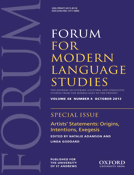
FORUM FOR MODERN LANGUAGE STUDIES
Nurturing Innovation in Language ScholarshipFORUM FOR MODERN LANGUAGE STUDIES is a prestigious academic journal published by Oxford University Press that has been serving the fields of literature and linguistics since its inception in 1965. This journal, with an ISSN of 0015-8518 and an E-ISSN of 1471-6860, plays a crucial role in advancing scholarly discourse on modern language studies, including literature and literary theory. With an impactful presence in both the linguistic and literary domains, it has been recognized in 2023 with a category ranking of Q2 in Literature and Literary Theory and Q3 in Linguistics and Language. It stands out in the competitive landscape, holding a notable position within Scopus rankings, including a 70th percentile ranking in Literature & Literary Theory. While the journal currently does not offer open access options, it remains a vital resource for researchers, educators, and students passionate about the transformative power of language and literature. Its commitment to quality research and robust academic discussion underscores its importance, making it a key platform for those aiming to contribute to modern language scholarship.
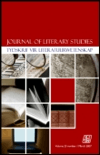
Journal of Literary Studies
Advancing literary discourse through innovative research.Journal of Literary Studies, published by UNISA PRESS, is a premier open access journal dedicated to advancing the field of literature and literary theory. With its ISSN 0256-4718 and E-ISSN 1753-5387, the journal has established itself as a leading platform for innovative research since its inception in 1985, with a notable convergence period running through to 2024. Recognized in the Q1 quartile of literature and literary theory, the journal ranks impressively at #236 out of 1106 in its category according to Scopus, highlighting its impact in the arts and humanities with a percentile rank of 78th. The journal's open access model, adopted in 2022, reflects its commitment to accessibility and dissemination of knowledge globally, making it an essential resource for researchers, academics, and students alike. With an editorial focus on interdisciplinary approaches and contemporary critical discourse, the Journal of Literary Studies serves as a vital vessel for the exchange of ideas and scholarly dialogue in the intricate landscape of literary studies.
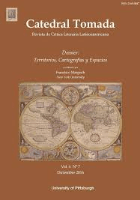
Catedral Tomada-Revista de Critica Literaria Latinoamericana-Journal of Latin American Literary Criticism
Exploring the Depths of Latin American Literary CritiqueCatedral Tomada - Revista de Crítica Literaria Latinoamericana is a pioneering journal dedicated to the exploration and critique of Latin American literature and its broader cultural implications. Published by the University of Pittsburgh's Library System, this Open Access journal has been instrumental since its launch in 2013 in making scholarly discussions accessible to a wider audience. With an ISSN of 2169-0847, the journal serves as a vital platform for researchers, professionals, and students interested in Literature and Literary Theory, Cultural Studies, and Linguistics and Language. Its esteemed ranking places it in Quartile 1 for Literature and Literary Theory and Quartile 2 for the other categories, underlining its commitment to high-quality academic discourse. Converging insights through a quarterly publication schedule from 2019 to 2024, Catedral Tomada aims to foster a rich dialogue on Latin American literary criticism, encouraging innovative perspectives and diverse voices within the field.